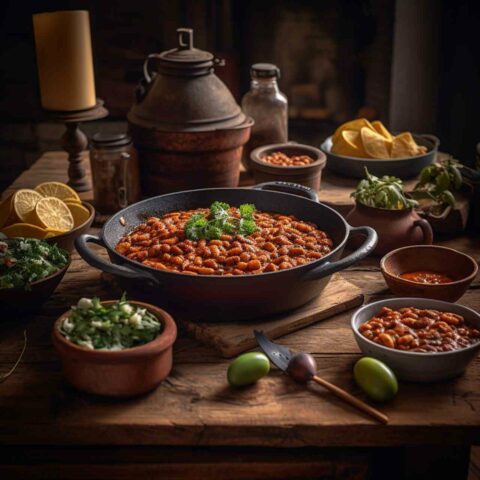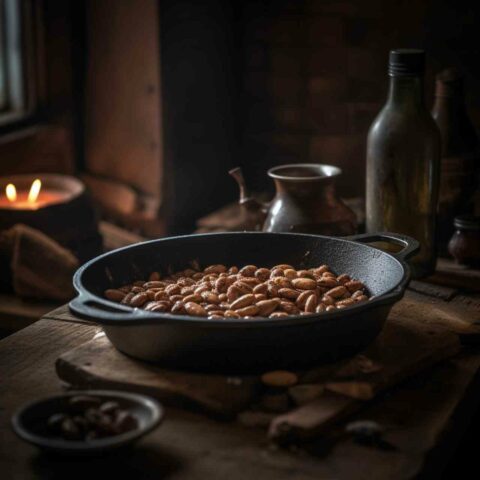Have you ever cooked a delicious pot of pinto beans only to be disappointed by a bitter taste?
This short post is specifically to help you figure out why your pinto beans are bitter and, more importantly, how to fix them.
This is important if cooking pinto beans for a big group.
Section 1: Getting to the Root of the Problem Of Bitter Pinto Beans
Understanding the source of the bitterness is key to solving the issue. Here are some common causes:
- Old beans: If your beans have been sitting in your pantry for ages, they can develop a bitter taste. (See how bean skins can affect taste)
- Unwashed beans: Beans can come coated in dirt or dust, which may contribute to bitterness.
- Hard water: Minerals in hard water can make your beans taste bitter.
- Cooking method: Overcooking or using the wrong cookware can also lead to bitterness.

Pinto beans go well with cornbread.
Section 2: Techniques to Fix Bitter Pinto Beans
First, make sure you have soaked them overnight in cold water with a splash of vinegar. This can help remove some of the bitter compounds that have built up in the beans.
Rinsing Canned Beans: A Must-Do Step
When using canned beans, always rinse them first. The thick liquid they’re packed in contains preservatives and high sodium levels, which can make your dish too salty. Draining and rinsing helps control saltiness and improves the overall taste.
Another way to fix bitter pinto beans is to add a pinch of baking soda to the cooking water. This will help neutralize the bitterness and make the beans taste smoother.

Another technique is to add a sweet ingredient, such as sugar, honey, or molasses, to offset the bitterness. Start with a small amount and taste as you go to avoid making the beans too sweet.
You can also try cooking the beans with a piece of kombu, a type of seaweed that can help reduce bitterness and improve the digestibility of the beans. Just be sure to remove the kombu before serving.
Experiment with these techniques to find the one that works best for you and your taste preferences.
With a little effort, you can turn those bitter pinto beans into a delicious and satisfying dish!
Section 3: Cooking Tips for Perfect Pinto Beans
To avoid encountering bitterness in the first place, follow these cooking tips:
- Use fresh beans: Beans are best consumed within a year of their harvest date.
- Invest in a water softener: If you have hard water, consider using a water softener or filtered water.
- Cook beans in a pressure cooker or slow cooker: These appliances can help ensure even cooking and a creamier texture.
- Season beans after cooking: Adding salt or acidic ingredients too early can toughen the beans and make them bitter.
Frequently Asked Questions:
- Can I still eat bitter pinto beans? Yes, bitter beans are still safe to eat, but they may not be as enjoyable as properly cooked beans.
- What can I add to my pinto beans to mask the bitterness? Try adding a pinch of sugar, a splash of vinegar, or incorporating the beans into a flavorful dish.
- Can I fix bitterness in canned pinto beans? You can try rinsing canned beans and adding a pinch of baking soda, but it may not be as effective as fixing bitterness in home-cooked beans.
- Why are my beans still hard after soaking and cooking? It could be due to the age of the beans, hard water, or adding acidic ingredients too early in the cooking process.
Conclusion: Bitterness, Be Gone!
With this guide at your fingertips, you’re now equipped to tackle bitter pinto beans head-on. Remember to pinpoint the cause of bitterness and use our suggested techniques to banish it from your beans. By following our cooking tips and applying these methods, you’ll be able to serve up delicious, creamy, and flavorful pinto beans every time.